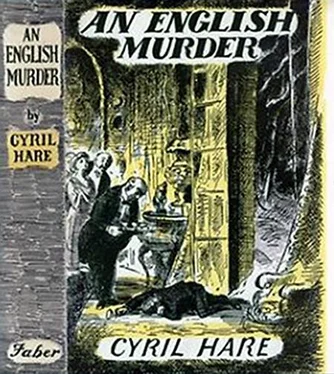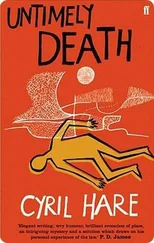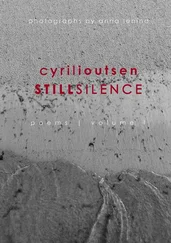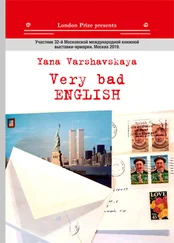In a gaunt room on the upper floor of a disused warehouse in South London, Robert Warbeck was concluding a monthly conference of section leaders of the League of Liberty and Justice. He was a tall, good-looking young man with red-brown hair and the fixed look of a fanatic in his rather prominent grey eyes. The dozen or so men he had been addressing for the last half-hour were a mixed collection of all types and classes. None were more than thirty-five years of age. The common factor that united them, apart from the complete absorption with which they hung upon their leader's words, was their dress. In common with him, each wore a pair of grey flannel trousers and a purple pullover, on the left breast of which was embroidered a white dagger.
"That will be all for this evening, gentlemen. You will be notified in due course of the date of the next conference. You are dismissed."
Each man rose from his chair, stood for a moment at attention and executed a somewhat complicated salute with the left hand which Robert Warbeck gravely returned. There then followed a moment of anticlimax. Retiring to the back of the room, the men stripped off their pullovers, handed them to one of their number and trooped out in their shirt-sleeves, to resume downstairs the coats and waistcoats of civil life.
Warbeck was left alone with the man who had received the garments. He watched in silence while they were ceremoniously folded up and put away in a large cupboard which ran the length of the room. Then he stretched himself wearily, removed his own and handed it to his lieutenant, to be put away in a special locked compartment of its own.
"The time is coming," he said, "when we shall wear the uniform in public. But that time is not yet."
"Yes, chief." The reply was respectful, but a shade perfunctory, as from a man who had heard the same remark many times before. "The key of your cupboard, chief."
"Thank you."
"You look tired, chief."
"I shall be glad of a few days' rest," Warbeck admitted, as though ashamed to confess to a human weakness.
"You leave town tomorrow, chief?"
"Yes. I shall look in at the Fulham branch on my way out of London. Those fellows want to learn the meaning of discipline."
"You'll teach them, chief."
"I shall be back at the beginning of next week. We can make arrangements for the North London rally then. Meanwhile you know where you can get in touch with me if necessary."
"Yes, chief. I hope you have an enjoyable Christmas."
Warbeck said nothing for a moment. He was knotting his tie and looking reflectively in the glass as he did so.
"Thank you," he said at last. "I shall have the enjoyment of doing my duty, at least. One owes something to one's family." "I'm afraid you may find your company rather trying, chief," his attendant ventured.
Warbeck swung round upon him.
"What do you mean?" he asked fiercely.
"Well, chief," the man stuttered, "I—I only meant—I was referring to Sir Julius, chief."
"Julius? What the hell has he got to do with it?"
"But I understood he was spending Christmas at Warbeck Hall, chief. Isn't that correct?"
"It's the first I've heard of it."
"There was a paragraph in this morning's Times , chief. I thought you must know about it."
"Good God! My father must be—" He checked himself in time. He had almost forgotten the golden rule, never to discuss his personal affairs with subordinates. "Well, thanks for telling me, Sikes," he went on, as he put on his coat. "I had missed the notice in The Times . I don't usually read the snobs' page, anyway. Forewarned is forearmed. I shan't be sorry to have the chance of giving that windbag a piece of my mind. Perhaps he won't have such an enjoyable Christmas. Good night!"
"Good night, chief."
He walked out into the drab street, where the thinly falling snow was fast turning into grey slush.
Chapter III
Father and Son
The snow did not start to fall in earnest until after darkness had set in, but once begun it continued with ever-increasing density until well after daybreak. Lord Warbeck, waking from the light sleep of an invalid, saw from his window his lawns and garden with the parkland beyond and the Markshire Downs in the far distance uniformly white, the fine details of the landscape gone, the outlines smoothed and thickened by the covering of snow. It would all have looked exactly the same, he reflected, to anyone lying in that bed on such a morning at any time since Capability Brown remodelled the plantations in the park, nearly two hundred years before. All trace of the neglect and disrepair of recent times had vanished. The drive again ran smooth and straight between its avenue of pollarded limes. The bowling-green for once displayed a surface as flat and true as it had done when it had been the whole duty of an able-bodied man to keep it in order. It was all an illusion, of course. Two days of thaw would suffice to reveal the hummocks and holes and weeds of reality—to reveal, also, he thought grimly, half a dozen burst pipes at different points in the cumbersome old house which he would somehow have to find the money to repair. No matter. For a prematurely aged, sick man, it was pleasant to indulge in the illusion while it lasted—especially as it might be for the last time.
When Briggs brought him his breakfast tray, he said, "I shall get up after lunch, Briggs."
"Very good, my lord."
"I shall want you to help me down to the library then. I shall have tea there with my guests."
"Dr. Curtis said, my lord——"
"Dr. Curtis won't come out here in this weather. He's got a weak chest, like his father. Never could stand a cold snap. He needn't know anything about it."
"No, my lord."
"How is Sir Julius this morning?"
"Sir Julius appears to be in excellent health, my lord. He breakfasted early—almost as early as Dr. Bottwink, in fact— and retired to work in his room. He passed some observation on going to put another sixpence on the income-tax, but I gathered that his intention was to be jocose."
"Let us hope so, Briggs. It sounds a grim kind of joke to me, but there's no accounting for tastes. Thank goodness, there doesn't seem to be much chance of my living to next Budget day, anyhow."
"Quite, my lord. That is—I'm sure I beg your lordship's pardon—we all hope——"
"Say no more about it, Briggs. It was tactless of me to refer to the subject."
"Not at all, my lord, I'm sure."
Briggs, rather pink about the cheeks, made to retire from the room, but hesitated in the doorway and cleared his throat. Lord Warbeck, who knew the symptoms, looked up from his breakfast.
"What is it, Briggs?" he asked.
"I was not informed, my lord," the butler said in somewhat reproachful tones, "that Sir Julius would be bringing a—a person with him."
"A person? I'm not sure that I—— Oh, dear me, yes, of course—the detective. It was stupid of me to have forgotten, but I'm afraid that is the price we have to pay for entertaining Cabinet Ministers. I hope you don't find his presence very disagreeable."
"No, my lord, I cannot say that exactly. I was a little exercised in my mind as to the matter of his meals. But on consideration I came to the conclusion that the position would be met by arranging for him to feed with the staff." "From my limited experience of Scotland Yard, Briggs, I think you did absolutely right," said Lord Warbeck, gravely. "I trust that your decision met with the approval of your colleagues?"
"I am bound to say, my lord, that there was at first some little unrest in the kitchen. But it passed over."
"I am relieved to hear that."
"The position was greatly eased by the person offering to assist with the washing-up, my lord."
"Excellent! That appears to solve all your problems, Briggs."
Читать дальше












